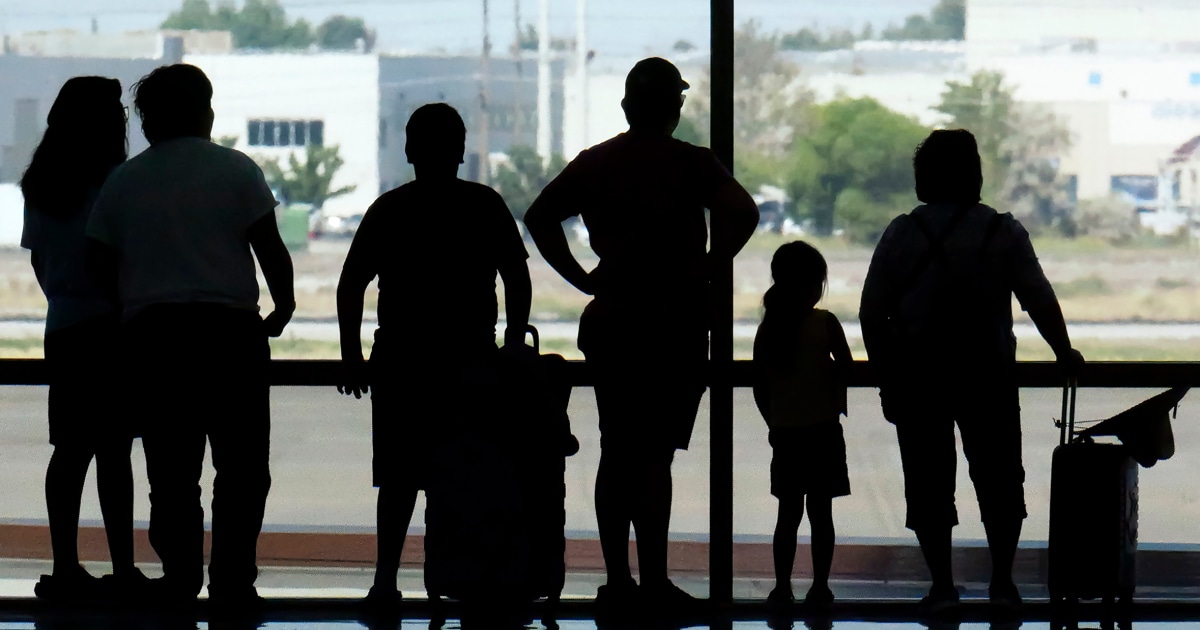President Biden’s base of support among key Democrats on Capitol Hill began to crumble on Sunday as a half-dozen top members of the House privately told colleagues he should withdraw from the presidential race amid growing concerns about his age and ability to win re-election.
During a virtual private meeting, the House Democrats — all senior members of powerful committees — discussed how to use their collective influence to convince Mr. Biden he had little chance of defeating former President Donald J. Trump, according to five people familiar with the confidential discussion, including three who were present, all of whom insisted on anonymity to discuss it.
The consensus during the session, which was convened by Representative Hakeem Jeffries, Democrat of New York and the minority leader, was that a change at the top of the ticket was needed to preserve the party’s chances of holding the White House and prevailing in the fight for control of Congress, the people said.
Among those saying explicitly that Mr. Biden should end his candidacy were Representatives Jerrold Nadler of New York, the top Democrat on the Judiciary Committee; Adam Smith of Washington, the ranking member of the Armed Services Committee; Mark Takano of California, the ranking Democrat on the Veterans Affairs Committee; and Joseph D. Morelle of New York, the top Democrat on the committee on House Administration.
A fifth Democrat, Representative Jim Himes of Connecticut, the ranking Democrat on the Intelligence Committee, also expressed uncertainty about Mr. Biden’s path forward.
Several participants in the meeting declined to comment on the confidential discussion. One attendee, Representative Don Beyer of Virginia, issued a statement afterward declaring, “I support President Biden.” Another, Representative Richard E. Neal of Massachusetts, the top Democrat on the Ways and Means Committee, called Mr. Biden a “visionary leader” on social media, adding: “Let’s keep it going.”
A Biden campaign official pointed to the president’s past insistence that he was staying in the race and noted that many top Democrats had expressed public support for him in recent days.
But the private concerns have only grown. Mr. Jeffries convened the high-level meeting, which included only ranking committee members, as a listening session to get input from all corners of the Democratic caucus about Mr. Biden’s candidacy as Democrats weigh how aggressive and public they want to be in elevating concerns in the face of the president’s defiant posture that only divine intervention could force him out of the race.
Rather than opening the meeting with a call to rally behind Mr. Biden’s candidacy, Mr. Jeffries and other leaders stayed mostly silent as lawmakers took turns sharing their doubts about the president’s viability. Some said their constituents believed the president should withdraw, while others said that they themselves felt he should.
Mr. Jeffries’s decision to hold the meeting at a time of mounting panic within the top echelons of his caucus was notable on its own; by allowing Democrats the chance to privately air such profound doubts, he left Mr. Biden with little choice but to acknowledge the concerns in his own party that he has so far brushed away.
It reflected where many congressional Democrats are landing as they head back to Washington after a weeklong recess to confront questions about Mr. Biden’s viability as a candidate and their own chances of holding the Senate and winning back the House in November.
They want to give Mr. Biden room to exit the race on his own terms before making any explicit call for him to do so. But they are also aware that there may be no way, at this point, to prove to voters that he is not too old for the task of defeating Mr. Trump — and there is mounting impatience that could transform private utterances into more public calls for Mr. Biden to step aside.
Some Democrats are still saying Mr. Biden deserves a final chance to right his campaign. Senator Christopher S. Murphy said earlier Sunday that the president’s first television interview since the debate fell short of alleviating deep concerns about his condition, and that he had more work to do to convince voters he is fit to run for and win re-election.
“Voters do have questions,” Mr. Murphy said on CNN’s “State of the Union.”
He added: “Personally, I love Joe Biden, and I don’t know that the interview on Friday night did enough to answer those questions. This week is going to be absolutely critical. I think the president needs to do more.”
He avoided directly answering whether Mr. Biden should step aside, saying: “I know there are a lot of voters out there that need to be convinced that Thursday’s night’s debate performance was a bad night.”
The carefully calibrated comments from Mr. Murphy were some of the first public alarm bells from the ranks of Senate Democrats, who have stayed mostly silent since the debate over a week ago but who are increasingly concerned about Mr. Biden’s ability to serve as the party’s nominee.
During the private House meeting, some lawmakers who took part, including Democrats who did not explicitly say they thought the president should stand aside, said they believed that Vice President Kamala Harris would be a strong candidate to take on Mr. Trump should Mr. Biden leave the race.
The drumbeat of opposition against Mr. Biden continuing as the party’s nominee came only after a few senior Democrats opened the meeting by speaking in support of the president. But the tide quickly turned after Mr. Nadler was the first Democrat to speak against continuing with Mr. Biden.
While no Democratic congressional leader has yet called on Mr. Biden publicly to step aside, five rank-and-file House Democrats have done so, and anxiety is beginning to bubble into the open among senators as well.
Mr. Murphy said he thought Mr. Biden could still defeat Mr. Trump. But he added that “the president needs to answer those questions that voters have.” Mr. Murphy insisted multiple times during the interview that Mr. Biden had to prove himself “this week” in “unscripted” conversations with voters.
“They need to see more from the president, and I hope that we see that this week,” he said.
The senator’s message also appeared aimed at warning the president and those around him that the defiant stance in response to real questions about Mr. Biden’s candidacy could not stand. The president has denied that a number of Democrats have called on him to step aside and declared that only “the Lord Almighty” could persuade him to withdraw from the race.
“There are still questions,” Mr. Murphy said. “The clock is ticking.”
Senator Angus King, an independent from Maine who caucuses with Democrats, echoed the message in a statement provided through a spokesman. Mr. King “believes the president should take every opportunity in the coming days to establish his capacity to continue the campaign and the job of the presidency through unscripted interviews and direct interactions with voters,” the spokesman, Matthew Felling, said on Sunday. “It is only through such a public process that he can demonstrate that Thursday was simply an off night and that his past ability to define the issues and seek common-sense solutions remains undiminished.”
Senator Sheldon Whitehouse of Rhode Island publicly voiced concerns last week over how candid the campaign was being about Mr. Biden’s condition, but he stopped short of calling for the president to step aside. And Senator Peter Welch of Vermont warned of a “fierce undertow” for Democratic House and Senate candidates if the Democratic presidential candidate lost badly in November.
Senator Mark Warner, Democrat of Virginia, is also working to convene Democratic senators this week to discuss a path forward and their concerns about Mr. Biden remaining as the nominee. Mr. Warner has privately expressed anguish about the president’s debate performance and doubts that he can remain in the race and win re-election.
Catie Edmondson contributed reporting.













